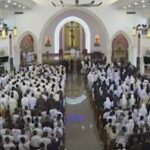Pope Francis Homily of Pope Francis at Holy Mass in Singapore Sports Hub National Stadium
– Thursday, 112 September 2024
“Knowledge puffs up, love is what builds up” (1 Cor 8:1).
First Reading (1 Cor, 8, 1b-7. 11-13)
All of us have knowledge; but while knowledge puffs up, love is what builds up. Someone may think that he has full knowledge of something and yet not know it as well as he should; but someone who loves God is known by God.
On the subject of eating foods dedicated to false gods, we are well aware that none of the false gods exists in reality and that there is no God other than the One. Though there are so-called gods, in the heavens or on earth — and there are plenty of gods and plenty of lords – yet for us there is only one God, the Father from whom all things come and for whom we exist, and one Lord, Jesus Christ, through whom all things come and through whom we exist.
However, not everybody has this knowledge. There are some in whose consciences false gods still play such a part that they take the food as though it had been dedicated to a god; then their conscience, being vulnerable, is defiled, . . . And then it would be through your knowledge that this brother for whom Christ died, vulnerable as he is, has been lost. So, sinning against your brothers and wounding their vulnerable consciences, you would be sinning against Christ. That is why, if food can be the cause of a brother’s downfall, I will never eat meat anymore, rather than cause my brother’s downfall.
Psalm 138
O Lord, you search me and you know me, you know my resting and my rising, you discern my purpose from afar. You mark when I walk or lie down, all my ways lie open to you. For it was you who created my being, knit me together in my mother’s womb. I thank you for the wonder of my being, for the wonders of all your creation.
Already you knew my soul, O search me, God, and know my heart. O test me and know my thoughts. See that I follow not the wrong path and lead me in the path of life eternal.
Gospel Lk 6:27-38
Jesus said to his disciples: ‘I say this to you who are listening: Love your enemies, do good to those who hate you, bless those who curse you, pray for those who treat you badly. To the man who slaps you on one cheek, present the other cheek too; to the man who takes your cloak from you, do not refuse your tunic. Give to everyone who asks you, and do not ask for your property back from the man who robs you. Treat others as you would like them to treat you. If you love those who love you, what thanks can you expect? Even sinners love those who love them. And if you do good to those who do good to you, what thanks can you expect? For even sinners do that much. And if you lend to those from whom you hope to receive, what thanks can you expect? Even sinners lend to sinners to get back the same amount. Instead, love your enemies and do good, and lend without any hope of return. You will have a great reward, and you will be sons of the Most High for he himself is kind to the ungrateful and the wicked.
Be compassionate as your Father is compassionate. Do not judge, and you will not be judged yourselves; do not condemn, and you will not be condemned yourselves; grant pardon, and you will be pardoned. Give, and there will be gifts for you: a full measure, pressed down, shaken together, and running over, will be poured into your lap; because the amount you measure out is the amount you will be given back.’
Homily of Pope Francis,
Dear brothers and sisters, if there is anything good that exists and endures in this world, it is only because, in countless situations, love has prevailed over hatred, solidarity over indifference, generosity over selfishness.
Without this, no one here would have been able to build such a great metropolis, because the architects would not have designed it, the workers would not have worked on it and nothing would have been achieved.
So what we see is a sign, and behind each of the works before us there are many stories of love to be discovered: of men and women united with one another in a community, of citizens dedicated to their country, of mothers and fathers concerned about their families, of professionals and workers of all kinds sincerely committed to their various roles and tasks.
It is good for us, then, to learn to read these stories, written on the front of our homes and on the paths of our streets, and to pass on their memory, in order to remind us that nothing lasting is born or grows without love.
Sometimes the size and grandeur of our projects can make us forget this and make us think that we can be the sole authors of our lives, of our wealth, of our well-being, of our happiness.
But, in the end, life always brings us back to one reality: without love we are nothing.
Faith, then, confirms and enlightens us even more deeply regarding this conviction, because it tells us that at the root of our capacity to love and be loved is God himself, who with the heart of a Father has willed and desired to bring us into existence in a totally gratuitous way and who in an equally gratuitous way has redeemed us and freed us from sin and death, through the death and resurrection of his only Son.
All that we are and can become has its origin and fulfilment in Jesus.
Thus, in our love we see a reflection of God’s love, as Saint John Paul II said during his visit to this country (cf. Homily at Holy Mass at the National Stadium, Singapore, 20 November 1986).
He went on to add the important point that, “love is characterized by a profound respect for all human beings, regardless of their race, creed or whatever makes them different from us”” (ibid.).
Brothers and sisters, these are important words for us because, beyond the wonder we feel at the works of men, they remind us that there is an even greater wonder to be embraced with even greater admiration and respect: namely, the brothers and sisters we meet every day on our journey, without discrimination, as we see in Singaporean society and in the Church, which is ethnically diverse and yet united and in solidarity!!
What is the most beautiful building, the most precious treasure, the most profitable investment in the eyes of God? It is ourselves, all of us, because we are beloved children of the same Father, called in turn to spread love.
The readings of this Mass speak to us of this in different ways.
From different points of view, they describe the same charity, which is gentle in respecting the vulnerability of the weak, provident in knowing and accompanying those who are uncertain on the journey of life (Ps 138), and generous, kind in forgiving beyond all calculation and measure (Lk 6:27-38).
The love that God shows us, and that he invites us to share with others, “responds generously to the needs of the poor… is marked by compassion for those who are suffering… is quick to offer hospitality and perseveres in times of trial. It is always ready to forgive and to hope”, even to the point of returning “a blessing for a curse… Love is the very center of the Gospel”,
Indeed, we can see this in a great many of the saints, those men and women who were so conquered by the God of mercy that they became a reflection of that mercy, an echo, a living image of that mercy.
To conclude, I would like to recall to mind just two of them.
The first is Mary, whose Most Holy Name we celebrate today.
She has given hope to so many people through her support and her presence, and she continues to do so!
How many lips have uttered and continue to utter her name in moments of joy and sorrow!
Because in her, in Mary, we see the Father’ love manifested in one of the most beautiful and abundant ways, because in her we see the tenderness – let us not forget the tenderness! – of a mother who understands and forgives everything and who never abandons us. That is why we turn to her!
The second is a saint who is dear to this land and who often found hospitality here during his missionary journeys. I am talking about St Francis Xavier, who was welcomed in this country on many occasions, the last time on 21 July 1552.
We still have a beautiful letter that he addressed to Saint Ignatius and his first companions, in which he expressed his desire to go to all the universities of his time to cry out “like a madman… [to] those with more learning than love” so that they would feel compelled to become missionaries out of love for their brothers and sister, and to “cry out with all their heart: ‘Lord, I am here! What do you want me to do?” (Letter, Cochin, January 1544).
We too could make these words our own, following his and Mary’s example: “Lord, here I am; what do you want me to do?”, so that they may accompany us not only in these days, but always, as a constant commitment to listen and respond willingly to the invitations to love and live justly that continue to come to us today from the infinite love of God.


